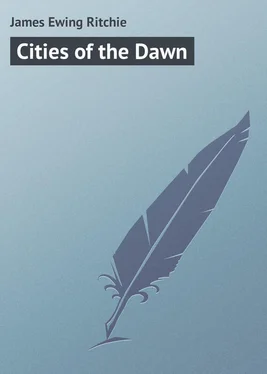James Ritchie - Cities of the Dawn
Здесь есть возможность читать онлайн «James Ritchie - Cities of the Dawn» — ознакомительный отрывок электронной книги совершенно бесплатно, а после прочтения отрывка купить полную версию. В некоторых случаях можно слушать аудио, скачать через торрент в формате fb2 и присутствует краткое содержание. Жанр: foreign_prose, foreign_language, на английском языке. Описание произведения, (предисловие) а так же отзывы посетителей доступны на портале библиотеки ЛибКат.
- Название:Cities of the Dawn
- Автор:
- Жанр:
- Год:неизвестен
- ISBN:нет данных
- Рейтинг книги:3 / 5. Голосов: 1
-
Избранное:Добавить в избранное
- Отзывы:
-
Ваша оценка:
- 60
- 1
- 2
- 3
- 4
- 5
Cities of the Dawn: краткое содержание, описание и аннотация
Предлагаем к чтению аннотацию, описание, краткое содержание или предисловие (зависит от того, что написал сам автор книги «Cities of the Dawn»). Если вы не нашли необходимую информацию о книге — напишите в комментариях, мы постараемся отыскать её.
Cities of the Dawn — читать онлайн ознакомительный отрывок
Ниже представлен текст книги, разбитый по страницам. Система сохранения места последней прочитанной страницы, позволяет с удобством читать онлайн бесплатно книгу «Cities of the Dawn», без необходимости каждый раз заново искать на чём Вы остановились. Поставьте закладку, и сможете в любой момент перейти на страницу, на которой закончили чтение.
Интервал:
Закладка:
If you want to visit Vesuvius, apply at Cook’s offices, where you will find everything arranged for you in the most agreeable manner, and no difficulty of any kind. His funicular railway is one of the wonders of the place. The ascent of the cone requires two hours’ hard walking in deep ashes and on hard rubble lava – an undertaking not very pleasant for people affected with delicate hearts and constitutions, or bordering on old age. Get into one of Cook’s railway cars, and you are up in a few minutes. At the lower station there is an excellent restaurant belonging to the wonderful John Cook, whose headquarters are the Piazzi del Martini. I dined once at his restaurant at the foot of the cone, and it is one of the few dinners in my life to which I look back with pleasure. I had a friend with me, of course. It is never pleasant to travel – at any rate, in a foreign country – alone. We had a good rumpsteak and French beans, an omelette, and a bottle of the wine whose praises were sung by Horace when the world was much younger and fresher than it is now. After dinner we sat on the terrace, drinking black coffee and smoking cigars. Of course, as an Englishman, it gave me pleasure to reflect that our beautiful Princess of Wales had been there before me in 1893, with Victoria of Wales, the Duke of York, and a distinguished suite. As I sat smoking, it seemed to me as if I was monarch of all I surveyed. Naples was at my feet, far away behind was the green Campagna, with but here and there a solitary dwelling, and before me, in all its glory, the bay and its islands. If old Sam Rogers had gone up there to write his ‘Italy,’ I think he would have done better than he did – at any rate, I was never so near heaven before; and this reminds me that I have said nothing of the means of grace available to English Protestants when they come to Naples. There is an English Church in the San Pasquale à Chiagia, a Scotch Presbyterian opposite Cook’s offices, and a Methodist.
There are many ways of getting to Naples. I came this time overland by Paris and Marseilles, and thence, as I have said, by the Midnight Sun . If the weather is fine, and the Bay of Biscay in good form, I prefer to come by the Orient steamers right away from London. You have then no trouble till you land in Naples. We leave Black Care behind as we slip out of English fog and cold into the region of cloudless skies and starry nights. We smoke, or read, or feed, or walk the deck, or talk in the pleasantest manner. Perhaps we get a glimpse of Finisterre. Heroic memories come to us as we pass the seas where the Captain was lost – it is to be feared in consequence of defective seamanship. All along the coast and on those faraway hills the noise of battle rolled, and not in vain, for the struggle that ended in Waterloo placed England in the first rank among the nations of the earth.
As soon as we cross the bay we think of Corunna and Sir John Moore. Afar off are the memorable heights of Torres Vedras. Cape St. Vincent, a bluff sixty feet high, with a convent and a lighthouse, reminds one of the brilliant victory won by Sir John Jervis, with Nelson and Collingwood fighting under him; and in a little while we are at Trafalgar, to which sailors still look as the greatest sea-fight in the history of our land, and as the one that saved the nation; and then you spend a day at Gibraltar. A Yankee friend once said to me, ‘I must go back to America. I can’t stay any longer in Europe; I shall get too conceited if I do.’ I, too, feel conceited as I skirt along that romantic coast, which you sight in a few hours after leaving Plymouth. Englishmen are always grumbling. There is no country like England; and an Englishman who is not proud of his native land, and ready to make every sacrifice for her, ought to be shot, and would be if I had my way.
CHAPTER IV
POMPEII AND VESUVIUS
It is needless to write that no one can go to Naples without paying a visit to Pompeii, if he would get a true idea of a Roman city, with its streets, and shops, and baths, and forum, and temples; and it is as well to read over Bulwer’s ‘Last Days of Pompeii’ – that master work of genius, compared with which our present popular novels are poor indeed – and then let the reader spend an entire day, if he can, among the Pompeiian remains, in the museum at Naples, which Garibaldi, when Dictator of Naples, handed over to the people. Pompeii is easy of access by the railway, which lands you at the very spot, after a short but pleasant trip. Much can be accomplished there and back for a little more than three francs. On Sundays Pompeii can be visited for nothing; on other days the charge is one franc, and when you have paid the guide the franc, I think you will agree with me that in no other part of the world can you see so much that is truly wonderful at so small an expense. Close to the gate are a hotel – the Hôtel du Diomede – and a restaurant, at either of which you can get all the refreshments you require; and if it is too hot to walk – and in the summer months Pompeii is a very hot place indeed – there are chairs in the grounds in which you can be carried all round and see all that is to be seen at very little personal fatigue.
Pompeii is spread out in an elliptical form on the brow of a hill, and extends over a space of nearly two miles. On one side of you is Vesuvius, and on the other the blue waters of the bay. One of the towns through which you pass in the train is Portici, the ancient Herculaneum; as it is, you are lost in wonder at the awful extent of the catastrophe which turned all this smiling land into a scene of desolation and death, and which, at any rate, led to the extinction of one philosophic career – that of the elder Pliny, a real victim to the pursuit of knowledge under difficulties. At the time of its visitation, Pompeii is reputed to have had a population of about 26,000.
Imagination fails to realize the agony of the hour as the swift, black, sulphurous death came down on all – the patrician in his marble halls, the tradesman in his shop, the miser at his desk, the devotees who cried to their gods for safety in vain, the slave, the freedman, the aged, to whom life had nothing to give, the tender, the beautiful, the young, to whom life seemed an exhaustless dream of joy. As in the days of the flood, there was marrying and giving in marriage. Here the baker had fled, and left his loaves in his oven; there was an eating-house, in which were found raisins, olives, and fish cooked in oil. There stands the tavern, indicated by the sign of the chequers, while the amphoræ of wines are still marked with the year of the vintage. An election was going on at the time of the catastrophe, and appeals to the free and independent are still preserved. In one place a schoolboy has scratched his Greek alphabet. In his sentry-box a sentinel was discovered, a grisly skeleton clasping his rusty sword. And the streets tell a piteous tale. In one a young man and woman had fallen together; in another part a lady was discovered attempting to flee with a bag of gold, and then there was seen the skeleton of a mother with her children, whom she was vainly seeking to save. In the house of Diomede, or, rather, in a vaulted cellar underneath, eighteen bodies were found of men and women who had evidently fled there for shelter. The probable proprietor of the house was found near the garden door, with the key in his hand, while beside him was a slave with valuables. It is evident that the city was a scene of vice and dissipation. Some of the inscriptions are too indecent to reproduce. I know not whether for this it becomes us to point the finger of scorn, we who read ‘Don Juan,’ who revel in Fielding, who reverence Dean Swift, who know what goes on in Paris and London by night, when respectability has gone to bed and Exeter Hall is shut up.
Читать дальшеИнтервал:
Закладка:
Похожие книги на «Cities of the Dawn»
Представляем Вашему вниманию похожие книги на «Cities of the Dawn» списком для выбора. Мы отобрали схожую по названию и смыслу литературу в надежде предоставить читателям больше вариантов отыскать новые, интересные, ещё непрочитанные произведения.
Обсуждение, отзывы о книге «Cities of the Dawn» и просто собственные мнения читателей. Оставьте ваши комментарии, напишите, что Вы думаете о произведении, его смысле или главных героях. Укажите что конкретно понравилось, а что нет, и почему Вы так считаете.












